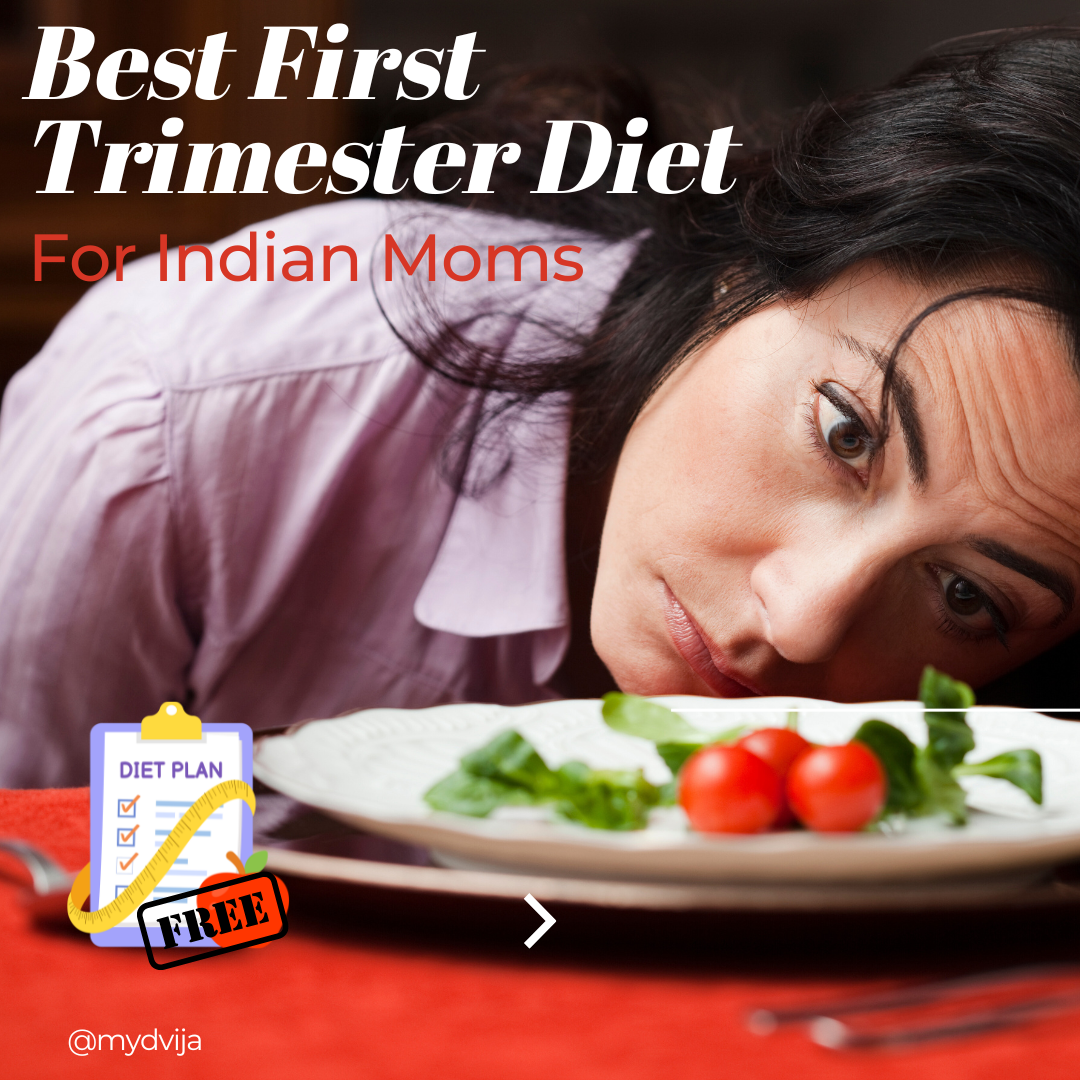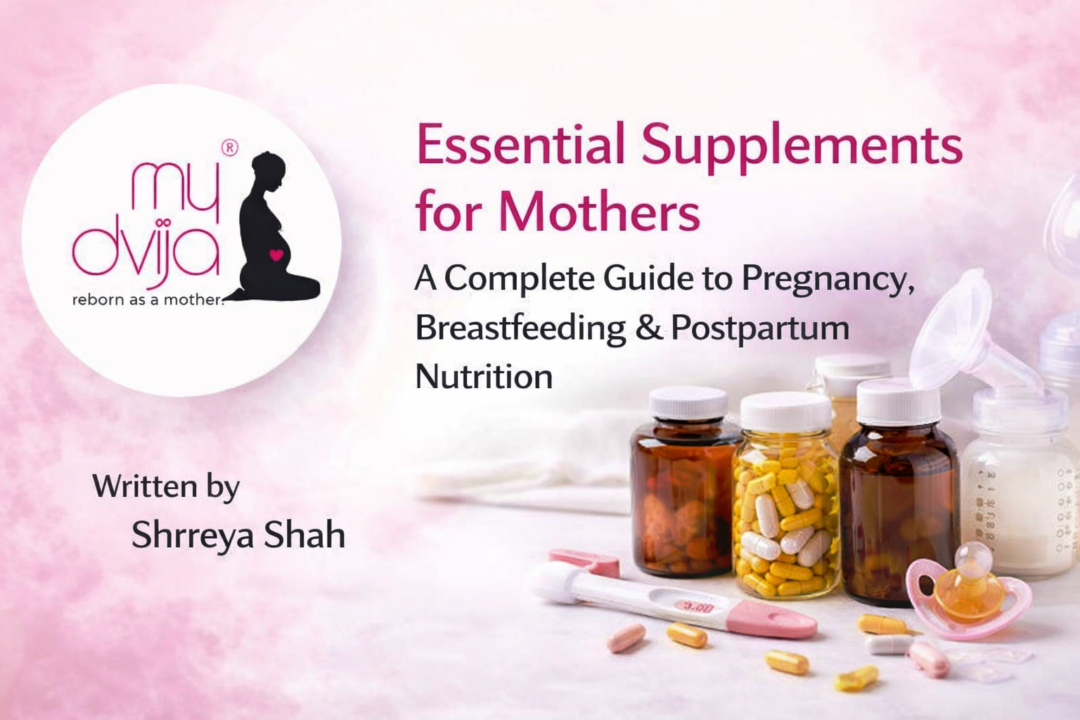
Blog
BEST FIRST TRIMESTER DIET FOR INDIAN MOMS, FREE 7 DAY DIET PLAN INSIDE


BEST FIRST TRIMESTER DIET FOR INDIAN MOMS, FREE 7 DAY DIET PLAN INSIDE
Introduction
Nutrition during pregnancy is important for both the mother and baby. Proper nutrition is essential for the baby’s development and helps prevent complications during pregnancy. Key nutrients include folic acid, iron, calcium, protein, healthy fats, and vitamins C and vitamin D. A balanced diet rich in vegetables, whole grains, lean proteins, healthy fats, and fruits supports overall health and well-being during this critical time.
Nutritional Needs in the First Trimester
First Trimester is a very crucial time in the process of baby development as the major organs are formed in this trimester. It is essential for the mother to consume proper nutrients to make sure her body is ready for nourishing the baby well. Here are few key nutrients a mother must include in her diet in the first trimester,
- Folic acid: – Folic acid plays an important role in promoting normal foetal growth and preventing macrocytic anaemia during pregnancy. Folic acid is needed for the synthesis of essential components of DNA and RNA. Also folic acid essential for the development of RBC which increase the mother volume.
- Iron:- Iron is important for the formation of haemoglobin, which is essential for transporting oxygen and nutrients from the mother to the baby via the placenta, as well as for removing waste products from the baby to mother. During pregnancy, blood volume increases, and the body requires more iron to support this change.
- Protein: – Protein is important for the growth and development of the baby. It helps increase muscle mass, supports the enlargement of the uterus, mammary glands, and placenta, and is crucial for the formation of amniotic fluid. Additionally, protein serves as a storage reserve for energy during delivery and lactation.
- Calcium: – Calcium is important during pregnancy for the development of the baby’s bones and teeth and can also help prevent preeclampsia and preterm birth. It is essential for growing a healthy heart and maintaining a normal heart rhythm. Additionally, adequate calcium intake ensures that the mother has enough calcium stored to meet the increased demands of breastfeeding after delivery.
- Vitamin: – In the first trimester, vitamins B6, vitamin C, and vitamin D are important.
Vitamin C: – Vitamin C is important during pregnancy because it helps the absorb iron.
- Vitamin D: – Vitamin D is important because it enhance maternal calcium absorption. Its active form, calcidiol and calcitriol, can cross the placenta and play a crucial role in the calcium metabolism of the baby.
- Vitamin B6:- Vitamin B6 is important during pregnancy because it is used to help control nausea.
Key Food Groups to Include in your Diet:-
- Fruits and Vegetables: Colourful fruits and vegetables are rich in vitamins (such as vitamins A and C) and minerals (including folate, calcium, and potassium). Examples include carrots, citrus fruits (like oranges, lemons, and grapefruits), broccoli, red cabbage, cauliflower, guava, strawberries, blueberries, and tomatoes. Leafy vegetables (such as spinach, lettuce, and beetroot) also provide essential nutrients. These nutrient-dense foods support the development of maternal health.
- Whole Grains: Whole grains are a great source of complex carbohydrates, providing energy for the mother. They are high in dietary fibre, which helps maintain digestion and prevent constipation. The fibre in whole grains also helps regulate blood sugar levels, potentially preventing gestational diabetes. Whole grains are rich in nutrients such as vitamin B complex, iron, magnesium, and selenium. Examples are wheat, rice, barley, maize, and oats.
- Lean Proteins: – Protein is important for the formation of new tissue, including muscles, organs, and the placenta. Adequate protein intake supports the overall growth of the baby. Protein is also essential for the mother’s health, helping to maintain muscle mass and support the increased blood volume during pregnancy. Examples of good protein sources include lentils, beans, eggs, and lean meats.
- Dairy Products: Dairy products play an important role in supporting the health of both mother and baby during pregnancy. They are high in calcium, protein, and vitamin D, which are essential for development. Additionally, yogurt, which contains probiotics, can improve digestion and promote gut health. This can help prevent constipation and support the production of vitamin B12. Example of dairy products include milk, yogurt, and paneer etc.
- Healthy Fats: Healthy fats are essential during pregnancy, particularly for the development of the baby’s brain. Omega-3 fatty acids, especially DHA (docosahexaenoic acid), are important for the development of the baby’s brain and nervous system, and they contribute to cognitive function and brain structure. Examples include fatty fish (like salmon), walnuts, flaxseeds, chia seeds, and avocados.
Sample Meal Plan for the First Trimester
| DAYS | BREAKFAST | LUNCH | DINNER | SNACKS |
| MONDAY | 2 vegetables omelette | 2 roti + cow ghee+ 1 bowl any seasonal sabji+1 bowl salad. (broccoli corn salad/ beet root+ +cucumber salad) 1 bowl brown rice / white rice |
1 ½ bowl mixed millets pulav 1 bowl of broccoli stir fry |
1 whole seasonal fruits / coconut water |
| TUESDAY | 2 piece of idli +1 bowl Sāmbhar chutney +1tsp ghee |
1 Jowar bhakari + 1 tsp cow ghee 1 bowl chicken curry ( less spicy) 1 bowl daal 1 bowl white rice/ brown rice 1 glass butter milk 1 bowl salad |
2 roti+ 1tsp cow ghee 1 bowl paneer subji 1 bowl rice 1 bowl salad |
½ bowl mixed nuts / 1 whole seasonal fruits |
| WEDNESDAY | 2 piece vegetable stuffed besan Chilli+ coconut chutney. |
2 roti + 1 tsp cow ghee 1 bowl rajma curry 1 bowl daal 1 bowl brown rice/ white rice 1 bowl salad |
2 roti + 1tsp cow ghee 1 bowl bhendi masala subji 1 bowl pulav 1 bowl salad |
1 bowl ragi puffed chiwada / jawar puffed chiwad |
| THURSDAY | 2 small vegetable paneer Paratha + curd |
1 multigrain bhakari + 1 tsp cow ghee 1 bowl fish curry 1 bowl daal 1 bowl brown rice/ white rice |
1 ½ bowl chicken biriyani 1 bowl salad 1 bowl corn broccoli soup |
1 glass coconut water / 1 whole seasonal fruits |
| FRIDAY | 2 piece beet root rawa chilla + coconut chutney / curd |
2 roti + 1 tsp cow ghee 1 bowl palak paneer subji 1 bowl daal 1 bowl brown rice/ 1 bowl white rice 1 bowl salad 1 glass buttermilk |
2 roti + 1 tsp cow ghee 1 bowl mug 1 bowl rice 1 bowl salad |
1 bowl corn / chicken soup |
| SATURDAY | 2 vegetables omelette | 2 roti + 1 tsp cow ghee 1 bowl daal methi subji 1 bowl daal 1 bowl brown rice/ white rice 1 bowl salad 1 glass buttermilk |
1 ½ bowl mixed millets pulav 1 bowl of broccoli stir fry 1 bowl salad |
1 bowl roasted Chana / roasted makhana |
| SUNDAY | 2 Ragi idli + coconut chutney | 1 Jowar bhakari+ 1 tsp cow ghee 1 bowl chicken curry 1 bowl daal 1 bowl brown rice / white rice 1 bowl salad |
2 roti + 1 tsp cow ghee 1 bowl egg bhurji 1 bowl daal rice 1 bowl salad |
1 bowl mixed vegetable soup |
Foods to Avoid:-
Raw or under cooked meat, raw egg, junk foods, caffeine, alcohol, excessive sugar, high sodium foods, foods with Trans fats, papaya etc.
Importance of Hydration
Drinking 8-10 glasses of fluids daily, mostly water, is very important during pregnancy. Adequate hydration offers many benefits. Frequent urination is common in pregnancy, but staying well-hydrated helps lower the chances of urinary tract infections and constipation. Proper hydration increases blood volume, which is essential for supplying oxygen and nutrients to both the mother and baby.
It also helps flush out excess sodium, which can prevent edema. Additionally, adequate hydration helps regulate body temperature, an important factor as pregnancy can cause fluctuations. Dehydration can lead to headaches, fatigue, and other discomforts, affecting overall well-being during pregnancy.
Tips for Managing Common Pregnancy Symptoms
Tips for Managing Common Pregnancy Symptoms
- Nausea and vomiting
Morning sickness in early pregnancy can be helped by eating small, frequent meals. It’s best to choose dry and easy-to-digest foods, like carbohydrates. Drink liquids between meals instead of with your food.
- Leg Cramps
Cramps during pregnancy often occur at night when the muscles suddenly contract. This may be linked to low calcium levels and an imbalance between calcium and phosphorus. Eating calcium-rich foods and taking calcium supplements can help relieve leg cramps.
- Craving and aversions
Cravings and aversions are powerful urges toward or away from certain foods that pregnant women experience. The most commonly craved foods are sweet and salty snacks or unusual combinations. Aversions involve a strong dislike or nausea toward specific foods or smells, which can make it difficult to eat. It’s important for mothers to listen to their bodies, satisfy cravings in moderation, and try to maintain a balanced diet despite any aversions.
Conclusion
As discussed above first trimester is the foundation of you and your child’s health through the period of pregnancy and after. Your diet can make define how peaceful your journey would go and even otherwise. Thus it is essential & advisable to seek an expert guidance on preparing yourself for the journey of pregnancy.
Shrreya Shah is a Child birth educator and has been training couples on Garbhsanskar & Womb wisdom for over a decade now. Here is the link of our Pregnancy first 100 days course, https://mydvija.com/product/garbhasanskar-with-shrreya-shah-team/ . To learn about Garbhsanskar you can check out our previous blogs linked below.






